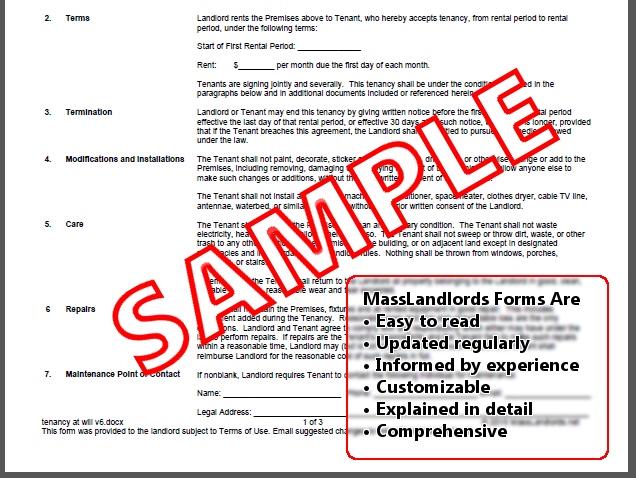Fixed Term Lease
Notes and Explanation
The main advantage of a lease is that it keeps tenants from leaving in the middle of winter. Winter is when you're going to have to offer the apartment for a lower rent to satisfy weaker demand. You may have a longer vacancy, as well. (The same applies if you're a long-distance manager and there are long periods of the year when you're unable to deal with turnover.) Leases have disadvantages. They're bigger commitments that may deter new renters in some markets. If there's a problem, you must have a cause and a lease paragraph that allows termination; if the lease failed to envision something, you could be stuck. Finally, leases could make tenants antsy prior to renewal. Some will want to stay another three months, which would have turned into two years, but instead they'll jump ship and give you notice.
Notes About This Downloadable Lease
You can compare this lease to the "tenancy at will." We kept the paragraph numbers the same.
How To Edit This Lease
The lease is a Word file with full access. If you modify the agreement, please add a comment that you have modified it. If you use the agreement as written, please leave the footer in your signed copies. We want you to contact us if your agreement ends up in court (good, bad or indifferent).
Revisions
- v7
- Removed reference to "15. Resident will not m. House or harbor fugitives or other illegal individuals."
- v6
- For satellite dish prohibition, incorporated statement of safety hazard to better comply with FCC regulation.
- Added prohibition on clothes lines without landlord's permission.
- v5
- skipped
- v4
- Best Practices from the Rental Housing Association of Greater Springfield and Western Housing Court
- Font changed from Arial 8 to Calibri 10, which allows for more readable text in less space.
- Eliminated table layout to increase ease of editing and eliminate whitespace.
- Separated cosigner agreement into separate, extended form.
- Eliminated clauses designed to cover special cases. Made default agreement applicable to even more Massachusetts landlords. Added complete list of over 20 “optional clauses” to cover regional and business differences.
- Eliminated legalese in phrases (for instance, “jointly and severally” replaced with explained Section 7e).
- Added a utilities table to conform to subsidy best practice and increase readability.
- Added emergency contact section.
- Changed “Tenant” to “Resident” to emphasize customer service.
- Clarified and combined Resident responsibilities with “Resident Will” and “Resident Will Not” sections.
- Eliminated legal concern of “lease with mutable terms” by providing a process for Residents to object to subsequent house rules.
- Eliminated paraphrasing of the law. For information on how to comply with specific laws or terms, visit MassLandlords.net/laws or contact an attorney.
- Added prohibitions on the growing of marijuana using unsafe practices. (Optional clause prohibits growing of marijuana altogether.)
- Added text reflecting new requirements for ten-year batteries in smoke and carbon monoxide detectors.
- Eliminated restrictions on the cable company. (It’s hopeless. We advise landlords to run cables into each room in each unit; the cable company will then restrict themselves to the basement.) Sustained prohibition on satellite dishes.
- Made many, many minor additions and improvements.
- Increased page count from five (including Addendum) to six (no Addendum required). Increased Flesch readability score from 37.0 to 39.8 (MS Word). Simplified sentence structure.
- For a complete commented reference indicating which section of v3 ended up in which section of v4, see “lease v3 redline to 2016 review.docx”.
- v4
- Internal version used during the Springfield review, not published.
- v3
- In “vital information,” clarified that ages of occupants were being asked for in the case of minors only.Fixed a cosmetic paragraph numbering goof starting at paragraph 25.
- v2
- In “Vital Information,” added a space to list the legally recognized ‘other occupants’. Also, added the word “Annual” to “Total Rent” to make it clear that the tenant is contracting for a total amount of money. Clarified wording of how rent is to be paid, and set the due date to be the first of every month.
- In “Termination,” removed misleading language about tenant bankruptcy. There is a process to evict a tenant who declares bankruptcy, but it requires relief from the automatic restraining order against creditors and isn’t as simple as terminating the lease.
- In “Occupancy,” gave the landlord the right to terminate for cause if the tenant brings in anyone to live in the premises for more than 20 days in a year and the visitor is not listed on the lease.
- In “Trustee,” now called “Ownership,” added clarifying language to cover all possible types of corporate entity.
- In “Legal Use Only,” broadly expanded the ability of a landlord to terminate the lease for crime, firearms, and drugs. Also, we now grant the landlord a power of attorney to seek restraining orders against the tenant’s guests.
- In “Utilities,” brought the Addendum terms forward, in case the addendum is not used, and called for the landlord to pay water and sewer.
- In “Copies,” landlord should have only 7 days to return a signed copy of the rental agreement.
- In “Removal of Personal Property,” wrote some clarification about how the Massachusetts process works.
- In “Fire or Casualty Loss,” added the phrase “force majeure” to cover unforseen circumstances.
- In “Future Landlord Rules,” added requirements on landlord notices for maximum enforceability.
- In “Tenant Default,” struck the part allowing the landlord to collect the difference between fair rent and lease rent. Based on experience this would not be granted by a court.
- The section “Leaving the keys behind” has been removed. If a tenant leaves the keys behind, other provisions of this agreement take effect.
- v1
- Original version.
To view this form, you must be logged-in and a member in good standing

MassLandlords is a nonprofit dedicated to helping owners rent their property. We try our best, but we can't guarantee these forms will always work. We provide legal information but never advice particular to your situation. Nothing on this site is meant to create an attorney-client relationship. We advise you consult with an attorney.





